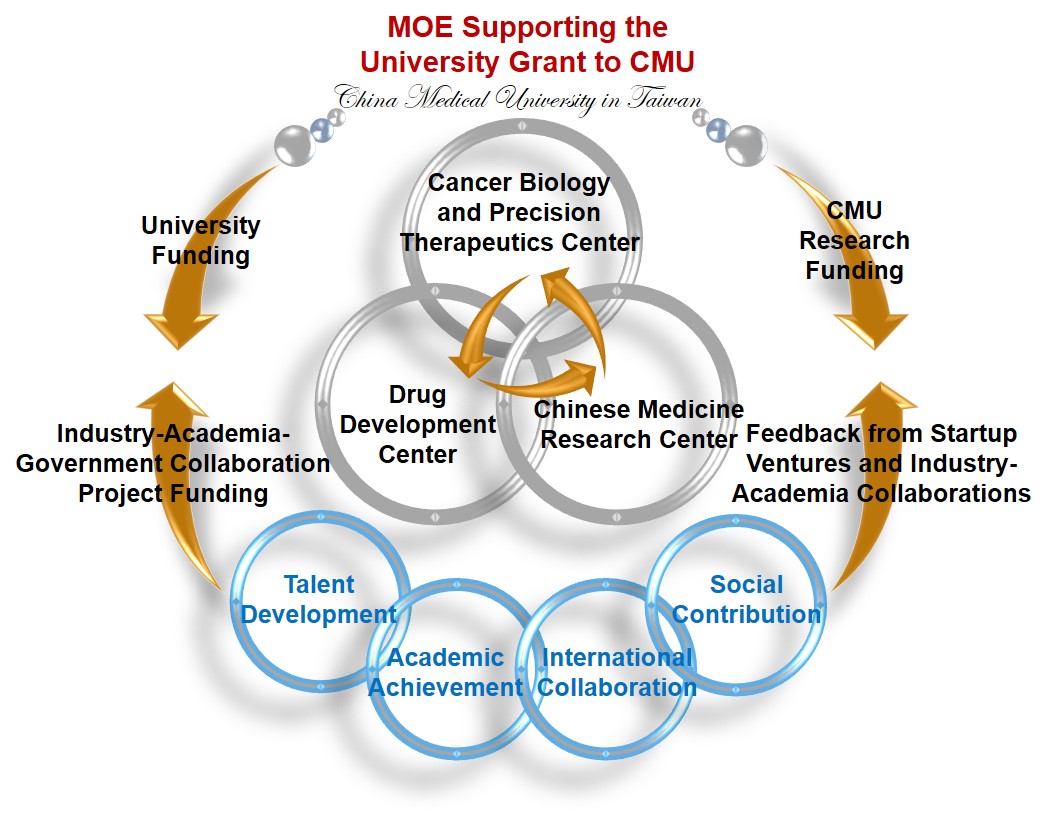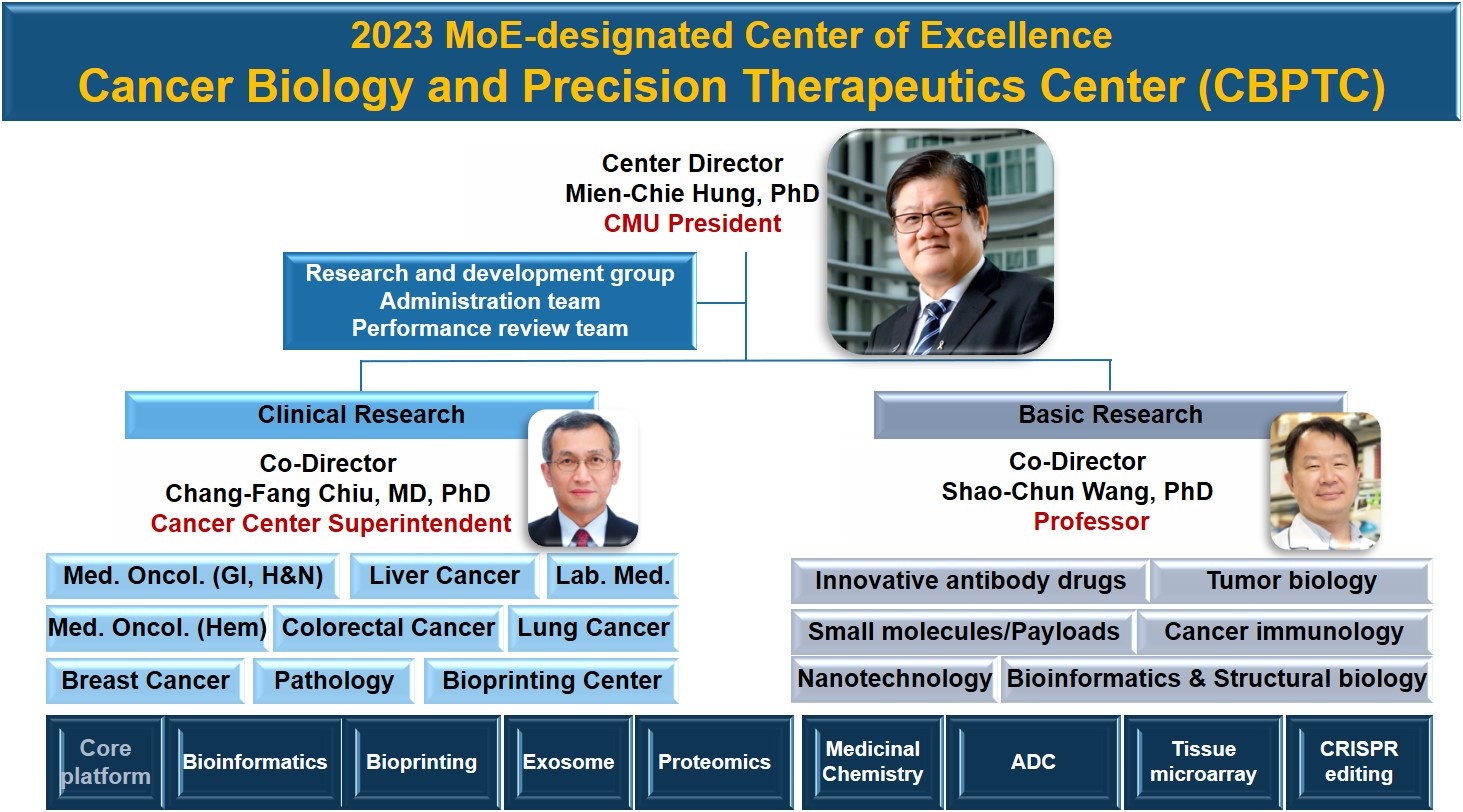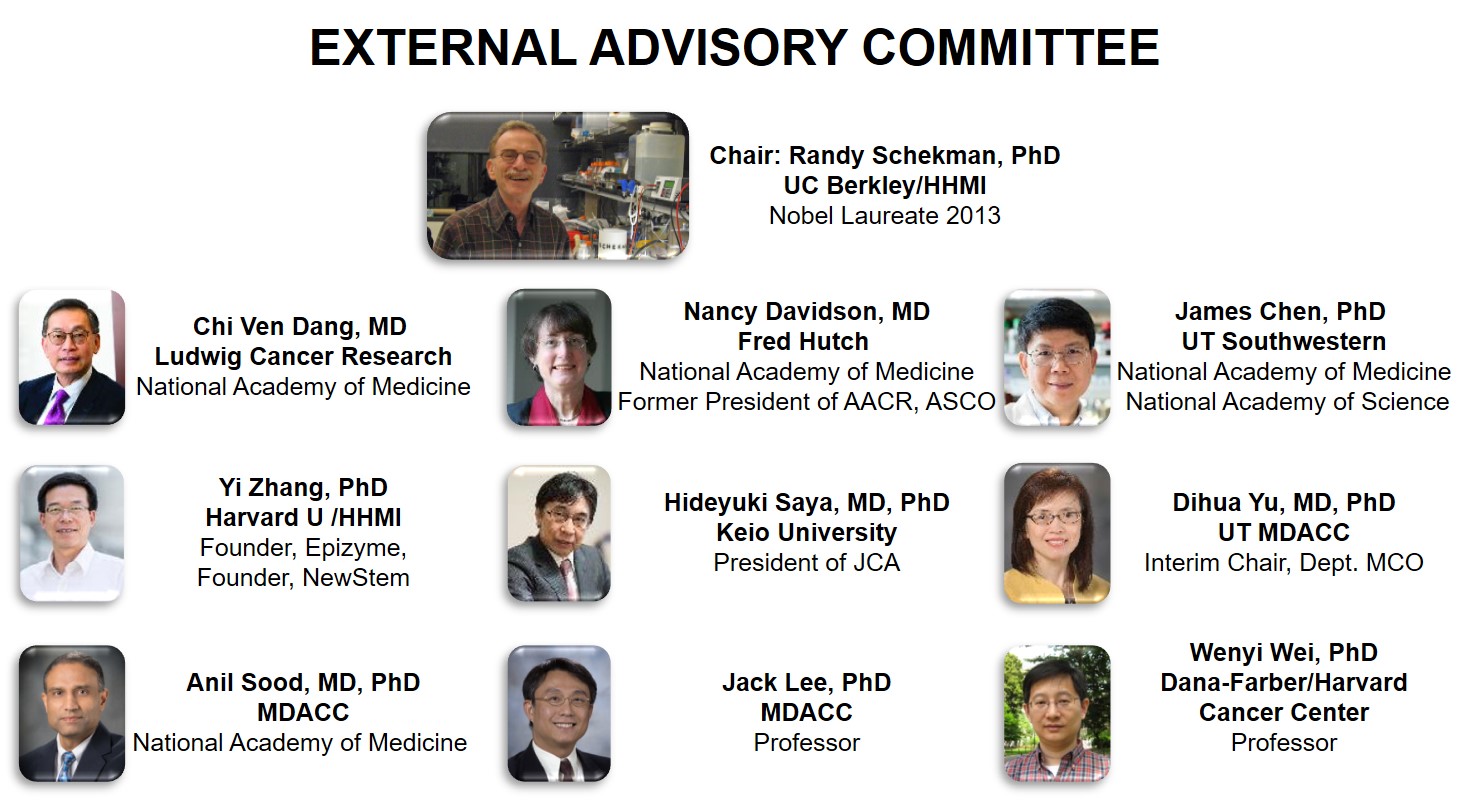Cancer Biology and Precision Therapeutics Center (CBPTC)
History
Cancer research has been a major focus of China Medical University (CMU) for many years. Academician Mien-Chie Hung was appointed president of CMU in 2019 and immediately led the integration of CMU's Research Center for Tumor Medical Science (renamed the Research Center for Cancer Biology in February 2020), the Molecular Medicine Center at China Medical University Hospital (CMUH), and cancer-related clinical resources across the university. This initiative has greatly promoted translational cancer research. In accordance with the Featured Areas Research Center Program under the Higher Education Sprout Project of the Ministry of Education (MOE) in Taiwan, the Research Center for Cancer Biology was renamed the Cancer Biology and Precision Therapeutics Center (hereinafter referred to as the Cancer Biology Center or the Center) in 2022 to appropriately reflect the broad activities of the Center.
Since the implementation of the Higher Education Sprout Project (Phase 1) in 2018, CMU has conducted a resource assessment, including research resources, resulting in the formation of two major research teams: the "Chinese Medicine Research Center" and the "Drug Development Center". These teams have looked for effective components from classic texts. They are also investigating molecular mechanisms of disease, identifying drug targets, and developing new approaches to address major medical challenges. Through competition and collaboration with benchmark centers at renowned international institutions, the distinctive research centers at CMU in the first phase have excelled nationally in various aspects including talent development, academic impact, industry collaboration, social contribution, and international rankings.
With strong support from the CMU Board of Trustees, CMU's global rankings have also reached unprecedented levels, ranking 2nd, 2nd, 3rd among all universities in Taiwan by the three most prominent global university ranking systems, THE (2023), ARWU (2022), and US News & World Report (2023), respectively, and 1st among all private universities in Taiwan by all three ranking systems. CMU is proud to be ranked among the top universities in Taiwan in key biomedical fields. Examples include "Cell Biology", ranked #1 in Taiwan, "Oncology", "Molecular Biology and Genetics", "Endocrinology and Metabolism", "Agricultural Sciences", and "Food Science and Technology", ranked #2 nationally and #1 among private universities in Taiwan (US News & World Report); "Human Biological Sciences" and "Agricultural Sciences", ranked #2 nationally and #1 among private universities in Taiwan (ARWU); "Biological Sciences", "Medicine and Dentistry", and "Other Health", ranked #3 nationally and #1 among private universities in Taiwan (THE). In addition, according to the QS World University Rankings, CMU is ranked in the top 100 worldwide and #2 in Taiwan in the category of "Anatomy and Physiology", in the top 150 worldwide and #2 in Taiwan in "Pharmacy and Pharmacology", and in the top 250 worldwide and #4 in the category of "Medicine". These outstanding rankings reflect CMU's commitment to excellence in various academic fields.
President Mien-Chie Hung has an extensive background in cancer research from more than 30 years at The University of Texas MD Anderson Cancer Center, which is ranked as the top cancer research institution in the United States. With more than 20,000 employees focused on various aspects of cancer, including clinical work, education, treatment, prevention, and community outreach, President Hung served for a decade as Vice President of Scientific Officer for Basic Research. In February 2019, President Hung joined CMU, bringing his extensive administrative and cancer research experience to the university. Through programs such as the "Ying-Tsai (Distinguished) Scholars" and "Young Ying-Tsai (Distinguished) Scholars", he has successfully recruited more than 30 expert scholars from prestigious institutions around the world, many of whom specialize in cancer biology.
Since 2021, CMU has organized the International Conference on Advanced Biomedical Sciences (ICABS) in Taiwan every year. This event has attracted more than 26 distinguished participants, including Nobel laureates, members of the National Academy of Medicine in the United States, and prominent editors of journals such as Nature, Cancer Cell, and Cancer Research. Approximately 900 experts and scientists registered to attend both physically and online, making the conference a great success. CMU plans to continue to host major international conferences and 8-10 academic forums each year. These events will feature members of the U.S. National Academy of Sciences and the National Academy of Medicine, who will deliver lectures either in person or online and provide guidance to the university’s faculty and students. Through these international exchange activities, CMU faculty and students will have the opportunity to learn from world-renowned experts, develop a global perspective, and make connections between their research and cutting-edge international academic studies. In addition, President Hung established the Higher Endeavor Research Organization (HERO) three years ago. This organization conducts weekly two-hour paper discussions, reviewing 8-10 papers from high-impact journals in the latest cancer-related fields. The goal is to identify valuable entry points, conceptualize potential research projects and focus on cancer biology and precision treatment.
Due to the rapid growth of CMU's accumulated research capabilities, the "Chinese Medicine Research Center" and the "Drug Development Center" at the time of the second phase of the Higher Education Sprout Project were not sufficient to accommodate the accumulated research momentum of the past five years. In order to make CMU a top international institution in the next 5 to 10 years, we have established the "MOE Supporting the University Grant to CMU" and the "Cancer Biology and Precision Therapeutics Center" in the second phase of the Higher Education Sprout Project. In the future, the "MOE Supporting the University Grant to CMU" will be linked with the "Cancer Biology and Precision Therapeutics Center", the "Chinese Medicine Research Center", and the "Drug Development Center" to jointly achieve our eight major goals, including catching up with the world and solving major medical challenges, thereby enhancing the reputation of CMU.
The three research centers collaborate in a variety of ways, including pooling research resources, sharing experiences, and continuously innovating at the forefront of biomedical science. In addition to research collaborations among individual teams, established channels for collaboration include monthly joint meetings among researchers from the three centers, weekly meetings within each center, and research conferences chaired by President Hung. A notable initiative is the bi-weekly lecture series organized by our center, which invites scholars from within and outside the university to share their expertise. This series promotes research exchange and even facilitates data sharing to establish substantive collaborations. Our collective efforts have fostered a culture of scientific excellence that has helped CMU become a world-class research university and contributed to its international prominence in the field.
Center Introduction
In response to the significant and pivotal growth of CMU's cancer research capabilities in recent years, and to align with the important mission of the Featured Areas Research Center Program under the Ministry of Education's (MOE) Higher Education Sprout Project, President Mien-Chie Hung has strategically integrated CMU's clinical and basic research teams. This integration aims to enhance overall research efficiency and align with the university's development direction. As part of this effort, the previously named Research Center for Cancer Biology was renamed the Cancer Biology and Precision Therapeutics Center (hereinafter referred to as the Cancer Biology Center or the Center). Under the leadership of President Hung, the Center focuses on nurturing outstanding junior and senior medical and research talents, with special emphasis on tackling challenging cancers. The Center delves deeply into cancer mechanisms, develops distinctive precision treatment strategies, actively cultivates and recruits top talents, promotes international collaborations to enhance visibility, and fosters academic-industry partnerships. In addition, members of the Cancer Biology Center have published many papers in the top high-impact journals in recent years, including Nature, Science, Cancer Cell, Nature Cancer, Nature Cell Biology, Nature Review Clinical Oncology, Nature communication, Science Translational Medicine, Journal of Clinical Investigation, Journal of Hepatology, etc. We have also initiated several novel investigator-initiated clinical trials that will be completed by the Center. CMU is committed to building a translational cancer research powerhouse in Taiwan to help Taiwan's cancer biomedicine shine in the world. To achieve this goal, the Center proposes five major projects:
(1) Developing clinically relevant tumor cell targets by blocking key intracellular mechanisms in challenging cancers: Team members have developed small-molecule drugs with high specificity and low toxicity to inhibit key metabolic programs in liver cancer and triple-negative breast cancer (TNBC), phosphatases and tyrosine kinases that cause resistance to PARP inhibitors in breast and ovarian cancer, and the pathway that controls the KRAS oncogene in pancreatic cancer (National Innovation Award in 2021 and Bellinger Ingelheim Unicorn Award in 2022). Center members have consistently published high-impact papers in the field, including in Nature (2020), Nat Comm (2019, 2020), Cell Met (2019), and Nat Cancer (2022).
(2) Developing novel humanized antibodies to target critical cancer proteins on the cell surface: Highly specific humanized recombinant monoclonal antibodies were generated to target the methylated epithelial growth factor receptor (meEGFR), which is resistant to tyrosine kinase inhibitors (winning project of the 2022 National Innovation Award), and the important immunosuppressive protein B7-H3 in the tumor microenvironment. The pipeline continues to advance in the preclinical phase and is expected to enter clinical trials within the next five years. Relevant high-impact publications by Center members include J Clin Invest (2021), J Hepatol (2021), Nature Reviews of Clinical Oncology (2022).
(3) Conducting novel molecular marker-guided precision oncology clinical trials: The unique close integration of basic research and clinical practice has led to the identification of novel cancer biomarkers in tumors and blood that are essential for the formulation of personalized precision medicine. These include the RNA editing enzyme ADAR1 in pancreatic cancer, the protein kinase PKCδ in lung cancer, and the development of a technology to monitor disease progression and therapeutic response in multiple myeloma patients using high-resolution mass spectrometry to detect disease recurrence at an early stage and improve treatment efficacy to overcome this deadly disease. Examples of high-impact publications by Center members include Cancer Cell (2018a), J Clin Invest (2019), Nat Comm (2021a), and a recent submission to Nature Cancer.
(4) Developing novel therapeutics using cutting-edge translational technologies: We have established four award-winning platforms, including tumor neoantigen target identification, genetically engineered highly biocompatible tissue-specific exosome and nanoparticle delivery systems, and high-throughput patient-derived tumor microenvironment organoids for the development of precision anti-tumor drugs. The innovations will be translated into industrial applications, and the technologies will serve as platforms to support other projects with translational momentum. High-impact publications by Center members include Cancer Cell (2018b), J Clin Invest (2019), Nat Comm (2021b), and Sci Advances (under review).
(5) Antibody drug development from academia to industry and clinical trials: Two novel humanized recombinant antibodies targeting the receptor tyrosine kinase EphA10 and the immunosuppressive cell surface receptor CD24 (winning project of the 2022 National Innovation Award) of challenging human cancers such as triple-negative breast cancer were developed. These two antibodies utilize proprietary sequences of the complementarity determining regions for technology transfer (EphA10) and industrial collaboration (CD24) with Shine-On Biomedical Co., Ltd. Product pipelines including therapeutic antibodies, antibody-drug conjugates, and multi-specific immune cell targeting derivatives are being developed and are moving towards IND filings and clinical trials in five years. These translational researches have resulted in publications in peer-reviewed journals, including Cancer Res (2018), J Biol Chem (2022), and Mol Cancer Ther (2019).
A comprehensive approach will be taken to develop CMU into a world-class institution over the next 5 to 10 years. The "MOE Supporting the University Grant to CMU" will serve as the linchpin, linking the "Cancer Biology and Precision Therapeutics Center", the "Chinese Medicine Research Center" and the "Drug Development Center" to collectively achieve the university's eight major goals, including aligning with the world and solving major medical challenges. These three research centers will collaborate in various ways to pool research resources, share experiences, and continuously innovate at the forefront of biomedical science. We will leverage complementary areas of expertise and technical support, and share core facility platforms to make breakthrough discoveries in biomedical research. This collaboration will propel CMU toward its goal of international excellence, enabling the university to focus on research and address major medical challenges.

Organizational Structure


Goal & Strategy
To achieve the goal of becoming a world-class cancer research center, the development plan includes the following key strategies: (1) biomarker identification and mechanism research; (2) establishment of drug development and analytical testing platforms; (3) early-phase clinical trials. In line with the "Biomedical Industry Innovation Program" policy, the Center is actively involved in the development of various types of cancer treatments, including antibody drugs, small molecule targeted therapies, and cell-based therapies. To date, the Center has achieved promising results and is committed to advancing clinical trials and commercialization efforts. The ultimate goal is to gain FDA approval for these treatments, which will have a significant impact on improving the lives of cancer patients. In addition, the Center aims to solidify its reputation as a world-class cancer research center through meaningful international collaborations. These collaborations will not only contribute to the global fight against cancer, but will also position the university as a prominent player on the global stage, making significant contributions to cancer research and treatment worldwide.
